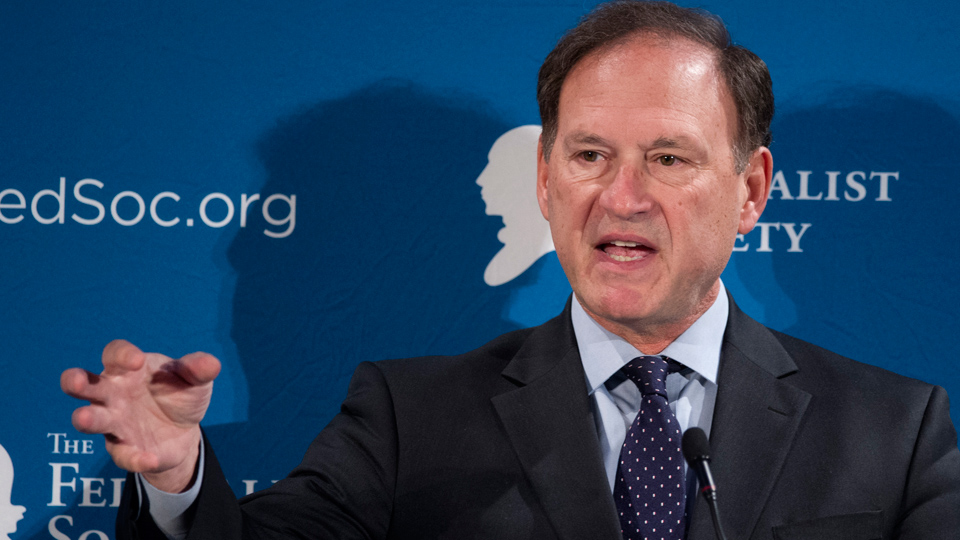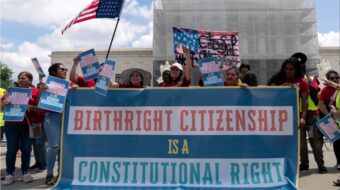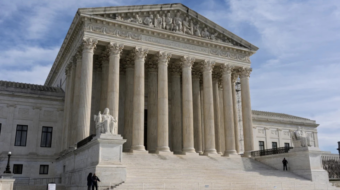
Read Part 1 of this article here and Part 2 here.
In her dissent to the Supreme Court’s recent Janus decision, which declared that public sector unions’ right to collect fair share dues from non-union members violated those workers’ First Amendment rights, Justice Elena Kagan lambasted the ruling for “turning the First Amendment into a sword.” She criticized it for exploiting the First Amendment to curtail rather than foster freedom and democracy, asserting that the First Amendment “was meant not to undermine but to protect democratic governance—including over the role of public-sector unions.”
Reading Justice Samuel Alito’s argument articulating the majority opinion, we can see that, indeed, the ruling turns the First Amendment on its head and actually threatens to do more to restrict employees’ collective speech in the workplace than enable it. Indeed, arguing in the name of First Amendment rights, Alito’s argument prepares the grounds of possibility for annihilating free speech and especially workers’ voice in the workplace.
For starters, let’s look at one of Alito’s most unabashedly obnoxious rhetorical moves. Alito characterizes as “most surprising” what he calls the Union respondent’s “originalist defense” of Abood, the case that set the precedent for allowing public sector unions to collect agency fees. As Alito summarizes, the union argued that “Abood was correctly decided because the First Amendment was not originally understood to provide any protection for the free speech rights of public employees.” Alito then distorts the union’s position with wry and condescending arrogance, writing that “we doubt that the Union—or its members—actually want us to hold that that public employees have ‘no [free speech] rights.’” Of course, unions aren’t arguing to deprive workers of free speech; rather they are pointing out the reality that workers do have only very restricted free speech rights in the workplace as individuals, which makes the role of unions—and their financial ability to fulfill that role—in providing a collective voice for workers and creating some degree of workplace democracy all the more crucial. Alito’s argument, in elevating individual free speech rights over that of the collective, ignoring the reality of unequal workplace power dynamics, actually undermines both the speech rights of the individual and the collective.
Here is the start of Alito’s folly. Throughout the opinion, he premises his argument on the assumption that employees in fact already have free speech rights in the workplace, going so far as to argue that it is the Union’s position that overturns precedent, not the Janus decision, as he writes, “Taking away free speech protection for public employees would mean overturning decades of landmark precedent.”
In point of fact, though, as I have written about elsewhere in the pages of People’s World, counter to the popular misconception, employees do not, in fact, have free speech rights in the workplace.
The Union to which Alito refers isn’t arguing that workers shouldn’t have free speech, but that as individual workers they don’t and this reality needs to be recognized to understand the important role unions fulfill in giving workers a voice.
Both this popular misconception and the truth of the matter I am pointing out became very evident in the aftermath of Colin Kaepernick’s protesting against racism and racial violence by kneeling for the National Anthem before San Francisco ‘49er games. Many turned the controversy over Kaepernick’s—and others’—protests into a free speech issue. Republican House Member Paul Ryan and Republican Governor of Illinois Bruce Rauner, for example, both weighed in on the controversy, asserting their disapproval with what they saw as Kaepernick’s unpatriotic attitude but recognizing (falsely) his First Amendment rights in doing so. Such responses were typical, distorting and glossing over the reality of the fact that workers do not enjoy the rights of free speech in the workplace.
The Kaepernick case was, as I argued in the earlier article referenced, more an issue of workplace democracy than simply free speech. Just consider a few examples from the recent aftermath of the Kaepernick controversy:
— Sportscenter host Jemele Hill avoided suspension by ESPN last September after calling Donald Trump a white supremacist in a tweet and provoking the White House to call for her firing. In October, however, ESPN did, in fact, suspend her for two weeks for violating their social media policy after she tweeted that fans who disagree with Dallas Cowboys owner Jerry Jones’ policy that he would bench players who knelt for the anthem should boycott those companies who advertise with the Cowboys. In short, whether she had been suspended or not, in each case the employer has the right to curtail employment based on what a worker says.
— Juli Briskman, a marketing executive at Akima, a government contracting firm, was fired for flipping off President Trump’s motorcade while riding her bike. She wasn’t even at work. Because she had been photographed and the photograph had been published with great popularity, she identified herself to her company and was promptly called into a room and fired for violating code-of-conduct policies. Clearly, she did not have the right to express herself as she chooses, even outside of the workplace, without consequences for her employment.
— Two Chicago police officers who were photographed taking a knee while on duty in their precinct office were reprimanded for violating department policy that prohibits officers from making political statements while in office.
— Policy of the National Basketball Association dictates that players must stand for the national anthem.
— Public workers, as a matter of law, do not enjoy First Amendment rights in the workplace. The 2006 Supreme Court ruling in the Garcetti v. Ceballos case clearly stated, “When public employees make statements pursuant to their official duties, they are not speaking as citizens for First Amendment purposes, and the Constitution does not insulate their communications from employer discipline.”
Yet Alito recognizes none of this reality of workplace power dynamics and the lack of workplace democracy. Admittedly, he does recognize the Garcetti case—on which Kagan draws heavily in her dissent—but only to dismiss it because, he writes, “in those situations [covered by Garcetti] the employee’s words are really the words of the employer, whereas here the union is speaking on behalf of the employees. Garcetti therefore does not apply.” This argument for dismissing Garcetti’s relevance is itself ridiculous. When employees enter a collective bargaining workplace, they do so accepting a set of rules, of work conditions, negotiated by the union and the employer. The rules or work conditions constitute an act of speech developed through collective bargaining but nonetheless sanctioned by the employer, which in the public sector is the government.
When it comes to collective bargaining in the public sector, the government sanctions the process and finally sanctions the contractual language, so the language of the workplace and of collective bargaining really is the employer’s language. Furthermore, our governments, in a representative democracy, are elected to represent us. Whether we voted for them or not, we don’t get to say they can’t speak for us. So, when the government employer decides it will determine its words or language through negotiation, collective bargaining, the worker, such as Mark Janus, really does not have the First Amendment right to override that speech.
In short, Alito is conceptualizing First Amendment rights in a highly unorthodox and broad way, granting to Janus speech rights and protections that no worker, and possibly no citizen, is actually entitled to by the First Amendment.
And the real danger in Alito’s granting Janus such fantastically expansive First Amendment rights is that in pretending to protect the free speech rights of the individual, it undermines the ability of workers both as individuals and as a collective to have a meaningful voice—the right of speech—in their workplaces.
If unions do not have the financial wherewithal to represent workers—a possible repercussion of the Janus decision—then workers, without the power of a collective structure to represent them, have little chance of representing themselves as individuals with any substantial influence on a playing field that is characterized by demonstrably unequal power relations.
Workers’ ability to organize has given them some chance of leveling the otherwise grossly unequal playing field of labor and capital. When I think back on some of the most dramatic moments in U.S. labor history, such as particularly bloody landmark moments in the coal industry, including the massacre of striking workers in Ludlow, Colorado in 1914, the Battles of Matewan and Blair Mountain in West Virginia in 1920 and 1921, the Herrin Massacre in Illinois in 1922, I am struck by the violence workers endured to form a union. They endured that violence—and our world largely sanctioned and allowed that violence against them—precisely because they knew they would remain powerless and without rights if they did not struggle to organize as a collective to ensure their voice in shaping their workplace and fight for basic rights.
Alito, however, remarkably and outrageously refuses to recognize this unequal playing field and, as argued above, the reality of the lack of workplace democracy. Legislating policies that weaken the collective structures that have historically given voice to workers in an otherwise unequal workplace will not empower the individual worker but rather leave him or her relatively even more powerless in an overwhelmingly unequal power dynamic.
What is most ironic in Alito’s rendering of the ruling—and what perhaps most reveals his disingenuousness and sophistry—is that Alito still holds that unions must represent workers whether they pay dues or not. The union just can’t make the workers they represent pay for this speech of collective bargaining, of grievance processing, and so forth. Thus, the union is still speaking for workers such as Mark Janus, whether he likes it or not, and he accrues the benefits. So, the ruling did nothing to actually address the issue of free speech, as it could have determined that individual workers can negotiate for themselves and represent themselves and not enjoy the benefits of collective bargaining.
But, as we know, the ruling wasn’t about protecting people or principles but about weakening people in unprincipled ways by undermining their ability to use their power collectively.
Like free stuff? So do we. Here at People’s World, we believe strongly in the mission of keeping the labor and democratic movements informed so they are prepared for the struggle. But we need your help. While our content is free for readers (something we are proud of) it takes money — a lot of it — to produce and cover the stories you see in our pages. Only you, our readers and supporters, can keep us going. Only you can make sure we keep the news that matters free of paywalls and advertisements. If you enjoy reading People’s World and the stories we bring you, support our work by becoming a $5 monthly sustainer today.










